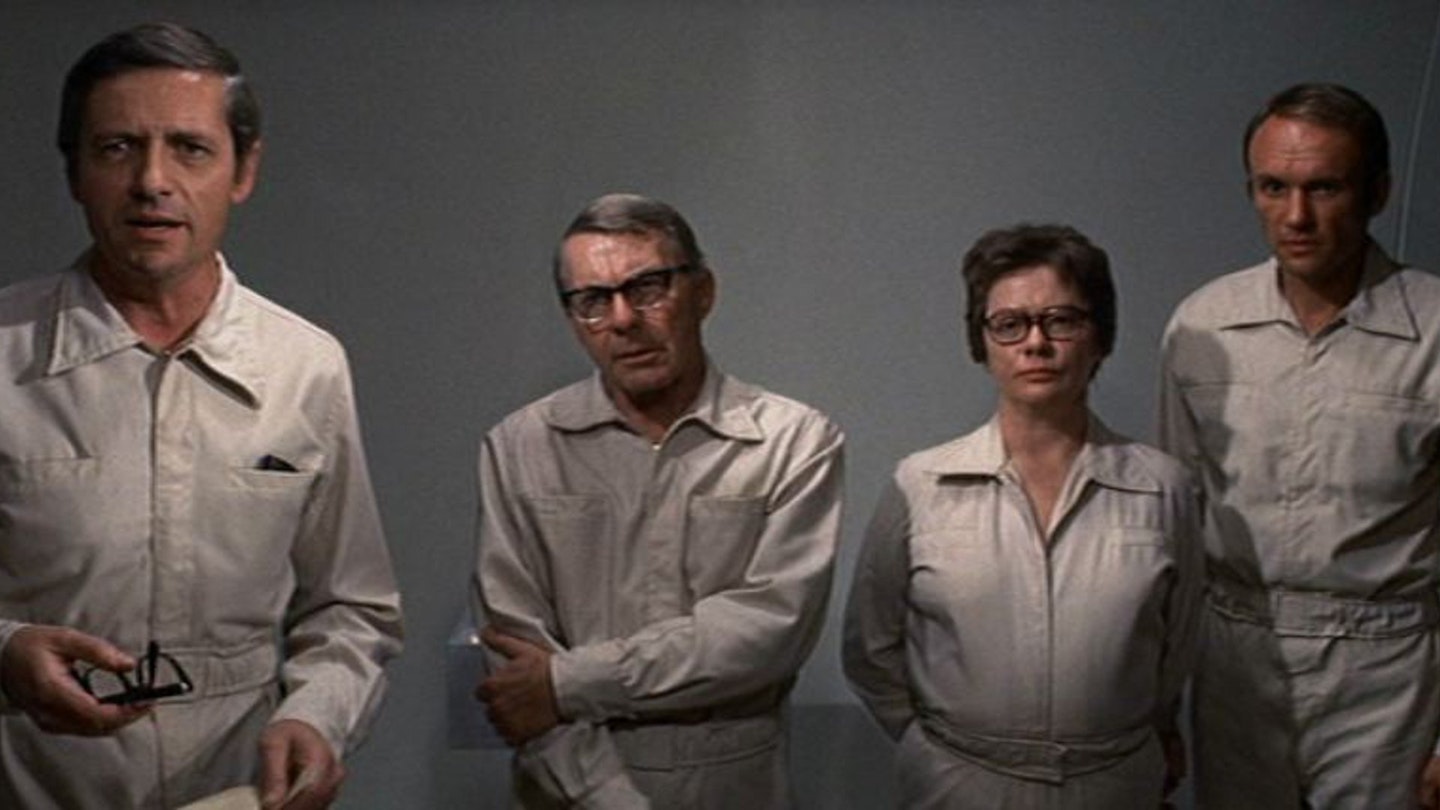“There's a fire.” Thus runs the simple call to arms for Dr. Jeremy Stone (Hill). The US air force have called a “Wildfire alert” — a satellite has crashed from orbit into the desert town of Piedmont, New Mexico, and now everyone is dead. That satellite was part of project Scoop, designed to collect alien microorganisms from outer space. And mankind is on the verge of the ultimate nightmare scenario — an alien virus that threatens the entire population of Earth. So a team of expert scientists are recruited to isolate and contain the dreaded outbreak before it's thank you and goodnight for all concerned. Curiously, though, a tiny baby and a booze-sodden old-timer have survived.
Taken from the excellent novel by a young doctor named Michael Crichton, whose febrile imaginings of the perils and accomplishments of science were destined to make him remarkably rich, this is a cautionary fable of extra terrestrial invasion on a microscopic level. In a remarkably focused manner the movie concentrates on creating dramatic tension from an unseen peril. Worked in a precise three act structure, the tension sways between the depiction of intellectual pursuit and the thriller dynamic. The first act, at the desolate Piedmont, reveals the devastation and mystery culminating in a horrifc powdered blood sequence. Then to Project Wildfire and its mammoth, multi-levelled underground bunker and the stringent demands of decontamination (including the gastro-intestinal tract) and isolation of the bug — dubbed the Andromeda Strain — to discover a way to eradicate it. The final act reverts to something more formulaic as the strain breaks out in the research facility.
What The Andromeda Strain does so well, and almost uniquely in film, is depict scientists as just that, scientists — rational, intelligent men and women striving to answer the call of a crisis (a fact assisted by the casting of quality unknowns rather than
major stars). Director Robert Wise (a versatile helmer who also gave us The Day The Earth Stood Still and the first Star Trek movie) understood that it is vital we believe in the movie as possibility rather than escapism. The team's approach is methodical and precise, a form of detective work on a hugely detailed level. It is also honest enough to depict the numbing tedium of scientific research. There is a strange true-to-life dichotomy between the urgency of proceedings and the necessary meticulousness of the process creating an unusual and highly effective inner tension.
This, not for the first time amongst the works of Crichton, makes a firm moral statement: science must be subservient to mankind. The Andromeda Strain offers up science overweened and flawed — the satellite, the centre's self-destruct programme, the inept communication devices that hamper their progress — and
science victorious: finally, it is brainy analysis that is the only hope. Interestingly, at the time of the film's release, Wise was criticised for making a show of the technology and special effects possibilities when his central theme was to accuse society of being seduced by science.
Wise shoots the movie in an appropriately cold, clinical style with Boris Leven's elaborate but precise production design a real feature. The set was constructed from 17 feet beneath Universal's biggest sound stage and such was Wise's dedication to scientific
accuracy that he insisted on every item of featured equipment (electron microscopes, computer etc.) being the real thing.
Of course, drama is required otherwise we're faced with an absolute yawn of basic scientific analysis. So the unpredictable organism mutates and learns to chow down on plastic (and therefore the protective suits). One of the team, Leavit (Kate Reid) unpredictably (and slightly implausbily) reveals an unmentioned epilepsy and blacks out at a crucial moment. And finally, when there is a dreaded breakout — due to the Andromeda Strain eating through the seals — and the centre's self-destruct nuclear detonation kicks in, Hall goes on a good ol' race-against-time to, well, switch it off. In no less than Indiana Jones fashion he dodges darts, lasers and poisoned gas to insert the off key. For the first time the film swaps cerebral tension and discussion for genuine action. If the centre is destroyed the virus will only mutate further, possibly becoming even more destructive. Ultimately, though, the pulp origins get the better of the realism and a conspiracy involving bacterial warfare stifles the clearheadedness of the plotting, playing a typically 70s anti-authority riff. But Wise (and Crichton) have done more than enough, concocting the most absorbing, riveting take on science fiction tempered with science fact.
